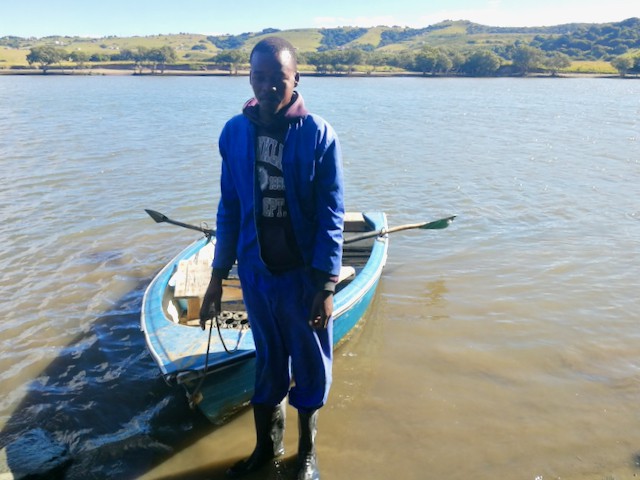Eastern Cape villagers have to cross a river to reach their nearest clinic
Provincial health department says National Health Insurance programme will help rural residents to access health care
Boat operator Ntobeko Ntlanganiso ferries people across the Xhora River to get to the clinic. Photo: Johnnie Isaac
To get to their nearest clinic, residents of villages near Elliotdale in the Eastern Cape cross the Xhora River in a rowing boat.
There is no useable road linking the villages directly to the clinic at Nkanya. By road, they first have to get to Elliotdale and then take taxis to Nkanya. It is costly and time consuming. So villagers choose either cross a river or to trek through the forest.
But they say the forest is dangerous and people have been attacked. A safer route is to cross the Xhora River by rowing boat, which costs R5 per person. To get to the boat, however, they have to hitchhike and drivers demand R20.
Ntobeko Ntlanganiso, who rows the boat, was taught by his uncle, who began the boat operation. He starts at dawn because people want to be early at the clinic and they have to get back home the same day. Otherwise they are forced to find a place to sleep over. He does about 10 trips a day. The boat takes a maximum of six people.
Passengers are not given life jackets. Ntlanganiso doesn’t have one himself.
Some people find it scary when it’s windy on the river.
“We have not had any incidents, and I don’t even think about it. I tell people who are afraid to cover their faces so that they don’t see until we have made it across to the other side,” says Ntlanganiso.
Nolusindiso Boklein and Nofasile Ngqo, who were returning from the clinic when GroundUp was there, said they use the boat because they’ve heard of people being attacked and raped in the forest.
Chief Nophazamile Gwebindlala said someone once attempted to abduct her cousin’s child in the forest. She encourages people to walk in groups because people on their own have been robbed of money and cellphones.
But Boklein said it was difficult to co-ordinate a group to cross through the forest because people’s clinic appointment dates shifted month to month.
Villagers also said it was difficult to access emergency services. They have to hire a vehicle for R700 to R800 if it’s an emergency at night and need to get to the closest hospitals in Emadwaleni and Zithulele.
Eastern Cape Department of Health spokesperson Sizwe Kupelo said there was a plan to build clinics in the area but did not give specifics or timeframes.
Support independent journalism
Donate using Payfast

© 2021 GroundUp. This article is licensed under a Creative Commons Attribution-NoDerivatives 4.0 International License.
You may republish this article, so long as you credit the authors and GroundUp, and do not change the text. Please include a link back to the original article.
We put an invisible pixel in the article so that we can count traffic to republishers. All analytics tools are solely on our servers. We do not give our logs to any third party. Logs are deleted after two weeks. We do not use any IP address identifying information except to count regional traffic. We are solely interested in counting hits, not tracking users. If you republish, please do not delete the invisible pixel.

